should ought to
- 格式:doc
- 大小:32.50 KB
- 文档页数:5
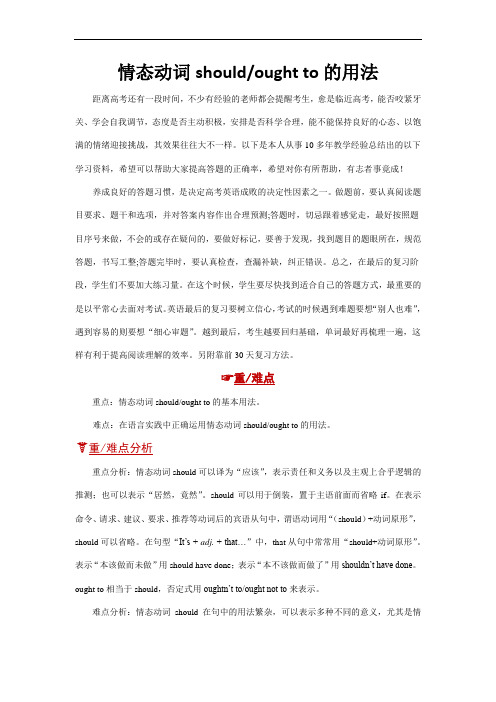
情态动词should/ought to的用法距离高考还有一段时间,不少有经验的老师都会提醒考生,愈是临近高考,能否咬紧牙关、学会自我调节,态度是否主动积极,安排是否科学合理,能不能保持良好的心态、以饱满的情绪迎接挑战,其效果往往大不一样。
以下是本人从事10多年教学经验总结出的以下学习资料,希望可以帮助大家提高答题的正确率,希望对你有所帮助,有志者事竟成!养成良好的答题习惯,是决定高考英语成败的决定性因素之一。
做题前,要认真阅读题目要求、题干和选项,并对答案内容作出合理预测;答题时,切忌跟着感觉走,最好按照题目序号来做,不会的或存在疑问的,要做好标记,要善于发现,找到题目的题眼所在,规范答题,书写工整;答题完毕时,要认真检查,查漏补缺,纠正错误。
总之,在最后的复习阶段,学生们不要加大练习量。
在这个时候,学生要尽快找到适合自己的答题方式,最重要的是以平常心去面对考试。
英语最后的复习要树立信心,考试的时候遇到难题要想“别人也难”,遇到容易的则要想“细心审题”。
越到最后,考生越要回归基础,单词最好再梳理一遍,这样有利于提高阅读理解的效率。
另附靠前30天复习方法。
☞重/难点重点:情态动词should/ought to的基本用法。
难点:在语言实践中正确运用情态动词should/ought to的用法。
☤重/难点分析重点分析:情态动词should可以译为“应该”,表示责任和义务以及主观上合乎逻辑的推测;也可以表示“居然,竟然”。
should可以用于倒装,置于主语前面而省略if。
在表示命令、请求、建议、要求、推荐等动词后的宾语从句中,谓语动词用“(should)+动词原形”,should可以省略。
在句型“It’s + adj.+ that…”中,that从句中常常用“should+动词原形”。
表示“本该做而未做”用should have done;表示“本不该做而做了”用shouldn’t have done。

7B Unit 6 Grammar-----情态动词(2) should/ /must一、should 和ought toshould在1. should 情态动词:应该(侧重于人的主观看法) (从形式上来看should 是shall的过去式)否定句形式:should not = shouldn’t 不该疑问句形式:将should提前。
[根据课本:我们用要should 和should not向别人提出建议,告诉别人最好做哪些事或做哪些事是正确的,此时与ought to和ought not to 有类似的含义,可以互换]①Y ou should be more careful next time.②We should help each other.③Should we look after him ?④Y ou shouldn’t be so careless.⑤What should we do next?二、must的用法(含have to用法)1. must 表示必须、必要。
如:Y ou must come to school on time. 你必须按时来上学。
★★★回答must引出的问句时,如果是否定的回答,不能用mustn’t,而要用needn’t或don’t have to。
例:—Must we finish our homework now ?—Y es, you must. (No, you needn’t.= No, you don’t have to. )[根据课本:我们用must告诉别人某事是必需的或是非常重要的,我们用mustn’t告诉别人不去做某事是必需的或是重要的]2. have to(不得不,必须)的含义与must相似,两者往往可以互换使用,但must与have to有下列几点不同:①must have tomust go now.I have to stay in bed because I am ill.②must只有一种形式,have则涉及人称、时态等方面的变化形式。

课题Language:Modal verbs: should & ought to教学目标1.区分、理解并掌握should和ought to的用法。
2.能恰当使用should和ought to 表达自己的意见和看法。
重点难点考点重点:区分should和ought to难点:ought to的否定式not 的位置; should 和ought to 的使用情境考点:should 和ought to 的使用情境教学基本内容、知识大纲1.When do we use ‘should’or ‘ought to’?2.should/ ought to + Vo3.should表劝告、建议之意,强调主观看法,语气较委婉,即“按我的想法该……”ought to 语气强于should,强调“有责任、义务或按道理应该……”4.The forms for different kinds of sentences:Positive: S + should/ ought to + do sth.Negative: S + should + not + do sth.S + ought + not + to do sth.Question: Should + S + do…?Ought + S + to do…?作业布置教师反馈知识掌握(30%)①②③④⑤⑥⑦⑧⑨⑩总得分满分100教师签名能力培养(40%)①②③④⑤⑥⑦⑧⑨⑩分思想态度(30%)①②③④⑤⑥⑦⑧⑨⑩本次课总体评价学生自评本次课收获和自我感受(对应分值上打ⅴ)①②③④⑤⑥⑦⑧⑨⑩学生签名Step One Reviewing the modal verbs by circling the modal verbs in each sentence as follows:1.Some people can live without meat.2.May I use the phone please, Mr. White?3.Could you tell me something about the book?4.You must not smoke here.5.What flavor would you like, chocolate or strawberry?6.We should put rubbish in the bin.7.She shouldn’t discuss it.8.Should we discuss it now? / Ought we to discuss it now?-- Yes, we should/ ought to.-- No, we shouldn’t/ ought not to.9.The students ought not to sleep in the class.10.Tom ought to hand in his homework on time.Step Two Leading in to teach the student the usage of ‘should’ and ‘ought to’ by explaining the above sentences from 6 to 10.1. There are three questions for the student to summarize the structure of should/ ought to + Vo (the verbs do not change their form after modal verbs ) as follows:●When do we use ‘should’ or ‘ought to’?●How to use them?●What’s the difference between ‘should’ and ‘ought to’?2. Tell the student the answers for the third question which is we can use the modal verbs should andought to to say what is best or right to do. Should and ought to are similar in meaning. But the voice of ought to is stronger than should with the meaning of doing something for responsibility or obligation.3. A task for consolidating the difference as follow:Task oneJoyce and Ben are talking about the newspaper. Complete their conversation with the words as follows: ought to discuss / shouldn’t start / should choose / ought to elect / should buyBEN We need a sports editor.JOYCE Then we (1) _____________ one right away.BEN We also need a title for the paper.JOYCE Then we (2) _____________ one as soon as possible.BEN Also, we need batteries for our recorder.JOYCE Then we (3) ______________ some.BEN Finally, should we start to publish next week?JOYCE We ____________ that with the others first. Perhaps we (5) _________ until next term.4. Telling the student the structures of different kinds of sentence after explaining Task one.Positive: S + should/ ought to + do sth.Negative: S + should + not + do sth.S + ought + not + to do sth.Question: Should + S + do…?Ought + S + to do…?Step Three Practice and consolidationThere are some tasks for practicing the structures of ought to and should and they will help the student to better understand and grasp the language point.Task two句型转换a)We should take good care of the young tree. (改为一般疑问句)________ we _______ good care of the young trees?b)You ought to turn off the lights when you leave the room. (改为一般疑问句)_______ I ______ ______ off the lights when I leave the room?c)You ought to put your bike under the tree. (改为否定句)You ______ ______ ______ ______ your bike under the tree.d)The child should drink some orange juice. (改为否定句)The child ______ ______ ______ orange juice.e)They should arrive at the station before 7 o’clock. (就划线部分提问)______ ______ ______ ______ at the station?Asking student to pay attention to the changes in Q4 when the word ‘some’puts into a negativesentence to assure the accuracy.Task three Multiple choices 选择题小测(共20小题,每小题5分,总分100分)1.( ) We ______ help the people in need.A. canB. ought toC. shouldD. could2.( ) One ______ cross the street against the red light.A. ought notB. ought to notC. shouldn’t toD. oughtn’t to3.( ) I missed the train. You ______ me that the timetable had changed.A. should to tellB. should have toldC. ought have to tellD. ought have told4.( ) We ______ throw the rubbish into the bin.A. shouldB. ought toC. mayD. would5.( ) Parents ______ raise their children until they are 18.A. shouldB. ought toC. mayD. would6.( ) They ______ discuss it now.A. ought to notB. not ought toC. don’t ought toD. ought not to7.( ) ______ he ______ his parents about this problem?A. Should, listensB. Ought, listens toC. Should, listen toD. Ought, listen to8.( ) He ______ here on time.A. should cameB. should comeC. should comesD. should coming9.( ) You ______ buy the ticket before getting on the train.A. oughtB. shouldC. mustn’tD. can’t10.( ) To protect our eyes, we ______ keep enough distance from books when we read them.A. shouldn’tB. ought notC. ought not toD. ought to11.( ) Tom ______ say sorry to Tracy because he broke her bike.A. shouldB. shouldC. mustn’tD. can’t12.( ) He said such a thing ______ be allowed happen.A. oughtn’t toB. might notC. may notD. needn’t13.( ) – Ought we to clean the classroom now?-- Yes, we ______.A. oughtB. shouldC. mustD. can根据要求改写句子a)You should do your homework carefully. (用ought to 改为同义句)_______________________________________________________________________b)Tom should look after his little sister. (改为一般疑问句)_______________________________________________________________________c)They ought to help their parents do the housework. (改为一般疑问句)________________________________________________________________________d)I ought to buy a new bike. (改为否定句)________________________________________________________________________e)Lucy should get to school on time. (根据划线部分提问)________________________________________________________________________f)Should we eat a lot of junk food? (作否定回答)_________________________________________________________________________g)I have to finish my homework before going to bed. (改为否定句)_________________________________________________________________________Step Four Homework八年级上册单词与短语Unit 1:term n. 学期publish v. 出版;发行elect v. 选举;推选chief adj. 主要的;首席的editor n. 编辑suggest v. 建议;提议experience n. 经验;经历vote v. 投票;选举secretary n. 秘书responsible adj. 有责任的;负责的section n. 部分;项list n. 清单;目录free adj. 免费的pay v. 付费;付酬consider v. 考虑conclude v. 结束;下结论fan n. 迷;狂热爱好者;风扇library n. 图书馆mayor n. 市长;镇长march v. 齐步走;行进( March n. 三月)circle n. 圈;圆形air n. 天空;空中activity n. 活动stall n. 摊位jar n. 罐子instrument n. 器械;仪器equipment n. 设备;装备include v. 包括band n. 乐队congratulation n. 祝贺;恭喜speech n. 演说;发言nervous adj. 紧张的confidence n. 自信心fashion n. 时尚;流行teenage adj. 青少年的design n. 设计feature n(报纸、电视等的)特写;专题节目present adj. 现在的;目前的member n. 成员committee n.委员会edition n. (报纸;杂志的)一期pleased adj. 高兴的clinic n. 诊所return v. 归还;返回break n. 课间休息;暂停department n. 部门lonely adj. 孤单的ever adv. 从来;在任何时候polite adj. 有礼貌的短语:take charge of= be in charge of 主管;掌管vote for / against 投票赞成;投票否决take notes 做记录;做笔记be responsible for 负责;有责任talk … over 详谈某事make a list of 把……列成清单be free for sb. 对(某人)免费pay for 付费(买…)make a decision about…对……作出决定in one week’s time 一周后a copy of 一份for free 免费的from the air 从空中of one’s own 某人自己的have the habit of (doing sth) 有……的习惯try one’s best to do sth 尽力做某事try to do sth 尽力做某事believe in oneself 相信自己once a week 每周一次be pleased with 对…满意keep fit 保持健康have a high fever 发高烧at break 课间休息时not a bit = not at all 一点儿都不get on well (with sb) (和某人)相处好for this reason因为这样Unit 2:detective n. 侦探;警探innocent adj. 清白的;无罪的guilty adj. 有过失的;有罪责的recent adj. 进来的;新近的case n. 侦查的案情;调查的案件vase n. 花瓶;装饰瓶clue n. 线索迹象pearl n. 珍珠earring n. 耳环;耳饰mud n. 泥;泥浆carpet n. 地毯deny v. 否认;否定notice v. 注意到necklace n. 项链proof n. 证据;证明admit v. 承认check v. 察看;核实suspect n. 嫌疑犯;可疑对象mean v. 意味着;insurance n. 保险jail n. 监狱empty adj. 空的rather adv. 很;非常telephone box n. 公用电话亭invite v. 邀请jacket n. 夹克衫;短上衣crime n. 犯罪refuse n. 拒绝experience n. 试验;spell v. 拼写ticket n. 票trainer n. 运动鞋;(平时穿的)便鞋jeans n. 牛仔裤belt n. 腰带;皮带doorway n. 出入口;门口bump v. 碰;撞enter v. 进入;进来centre n. 中心manager n. 经理clerk n.职员search v . 搜查;搜寻print v. 打印;印刷death n. 死亡enemy n. 敌人appear v. 看来;好像mark v. 迹象;污迹murder n. 谋杀;杀手短语:be the same… as…和…同样的…no longer/more=not…any longer/more不再break into强行闯入go to jail/ prison进监狱instead of= in place of代替…而不是behind bars =in jail/ prison坐牢by underground乘地铁(比较:at the underground station在地铁站)at the front of在…的前部(比较:at the back of 在…的后部)go in 进入室内refuse to do sth拒绝做某事bump into sb/sth 碰撞到某人/某物take away带走,拿走get away(from) 逃离;脱身at the time of在…期间say goodnight to sb向某人道晚安knock at敲击break…down打倒(或砸破)from a distance从远方in addition to=besides除…以外,还kill oneself自杀lose money输钱;亏损succeed in doing sth成功做了某事be angry with sb生某人的气be angry about sth 因某事而生气invite sb to do sth邀请某人做某Unit 3:hardly adv. 几乎不;几乎没有unaware adj. 不知道;未察觉dependent adj. 依靠的;受……影响type n. 打字;键入diagram n. 图表;示意图operate v. 操作;使运行railway n. 铁路;铁道fly v. 驾驶;操纵judge n. 法官;审判raise v. 引起;使出现instruction n. 指示;命令program n. 程序;指令essential adj. 必不可少的;及其重要的mistake n. 错误CD-ROM n. 只读光盘DVD-ROM n. 数字只读光盘drive n. 驱动器hold v. 容纳;包含video n. 录像;录像带ballpiont n. 圆珠笔keyboard n. 键盘supply n. 供应;供给company n. 公司reference n. 标识;编号product n. 产品quantity n. 数量;数额price n. 价格medium adj. 中等的grand total n. 总数;总额height n. 高度weight n. 重量stair n. 台阶touch v. 触摸smile v. 微笑else adv. 其他的;别的disagree v. 不同意average adj. 平均的;一般的roof n. 车顶;屋顶radio-controlled adj. 无线电遥控的salesman n. 售货员;推销员internet n. (国际)互联网research n. 研究;调查link v. 连接share v. 共享;共有wide adj. 广泛的;宽阔的service n. 服务的instant adj. 立刻的;速食的message n. 消息;信息短语:be short of 短缺be unaware of 没意识到;不知道be dependent on 依靠;依赖more importantly更重要的是…for the time being = at present 暂时,目前have great understanding of对……有很深的了解make mistakes/a mistake犯错not…but…不是……而是……leave sth/sb alone让某物/某人单独留下be made of用……做成(看得出原材料)be made from用……做成(看不出原材料)last for 持续in one’s opinion在某人看来prefer (doing) sth to (doing) sth比起…更喜欢…a research team 一个研究小组have the idea of…有…的想法link…together 把…连接起来communicate with 与…沟通;交流on the internet 在因特网上Unit 4:guard n. 卫兵;看守plain n. 平原capture v. 用武力夺取;攻占main adj. 主要的;最重要的pull v. 拉;拽order v. 命令drag v.(使劲而吃力地)拖;拉rope n. 绳子citizen n. 公民;市民celebrate v. 庆祝;庆贺stupid adj. 愚蠢的;糊涂的square n. 广场seize v. 抓住;捉住prisoner n. 囚犯;犯人fight v. 战斗;竞争succeed v. 成功;达到目的trick n. 诡计;把戏crown-maker n. 制造皇冠的人kingdom n. 王国slave n. 奴隶object n. 物体;东西displace v. 取代;替代palace n. 皇宫kilogram n. 千克;公斤silver n. 银器;银ancient adj. 古代的respect n. 尊敬god n. 神pray v. 祷告;祈祷fact n. 事实marry v. 结婚punish v. 惩罚unfortunately adv. 不幸地concern v. 担心;忧虑accept v. 接受snack n. 点心;快餐;小吃pretend v. 假装historical adj. (有关)历史的fictional adj. 虚构的;小说(中)的legend n. 传说;传奇故事cartoon n. 卡通perhaps adv. 可能;也许bow n. 弓arrow n. 箭century n. 世纪;100年army n. 军队;部队boxing n. 拳击(运动)control v. 控制;掌控ruler n. 统治者marriage n. 婚姻beauty n. 美丽;美好的东西wave n. 波浪gift n. 礼物;天赋harvest n. 收获;收割bury v. 埋葬;遮盖volcano n. 火山disaster n. 灾难silent adj. 沉默的ash n. 灰烬;废墟短语:rush down 急促冲下on wheel 下面装着轮子的make jokes about (someone)开(某人)的玩笑along with…与……同样地;除……以为(还)succeed in (doing sth)办到;做成with a trick 通过一个计谋be made of 用……做的pour…into…把……倒进……send (someone)to prison把(某人)送进监狱show respect to…尊重……pray to…祈祷;祷告feel like(doing sth)想要(做某事)put in prison关进监狱take care of 照顾;照料read about 读到trade in 做……买卖;做……生意Unit 5:lay v. 下(蛋);产(卵)fortunate adj. 幸运的creature n. 生物;动物tank n. 箱;槽satisfied adj. 满意的complaint n. 抱怨another det. 另一;不同的nap n. 小睡;打盹whisper v. 低语;小声说trunk n. 树干shape n. 形状;外形triangle n. 三角形description n. 描述regard v. 把……视为;看待since prep. 自……以后;从……以来camera n. 照相机surface n. 表面appearance n. 外表;外观similar adj. 相仿的;类似的type n. 类型;种类unusual adj. 特别的;不寻常的fin n. (鱼的)鳍top n. 顶部;顶端fat adj. 肥胖的;肥的pointed adj. 尖的;有尖头的topic n. 话题prove v. 证明;表示neck n. 脖子horn n. 角;喇叭forehead n. 前额unicorn n. 独角兽land n. 土地respond v. 回答;回应disc v. 唱片;磁盘receipt n. 收据;收条apology n. 道歉bean n . 豆;菜豆bug n. 虫子sour adj. 酸的awfully adv. 很;非常local adj. 当地的;本地的event n. 发生的事情;公开的活动certain adj. 确实;肯定horrible adj. 恐怖的;讨厌的;极坏的wing n. 翅膀claw n. 爪;脚爪breathe v. 呼吸fisherman n. 渔夫net n. 网beg v. 请求;祈求offer v. 主动提出;自愿给予promise v. 承诺;答应shore n. 岸;滨terrible adj. 可怕的;非常讨厌的storm n. 暴风雨thunder n. 雷lightning n. 闪电短语:in no time立刻;马上the most beautiful creature alive 最美的活物sell out (of) 售完;卖光leave for 出发前往receive a complaint收到投诉make/have a complaint(n.) about = complain(v.) about 投诉/抱怨某事take pleasure in doing sth从做某事中得到乐趣be satisfied/pleased with 对…满意according to 根据in the shape of 呈……的形状be based on 以…为基础describe doing sth. 描述做/见过某事describe … as 把…描述成…set up 建立,安排,摆放或竖起…all one’s life 某人的一生;终生report doing sth. 报道了某事an expert on …某方面的专家except for除了…之外start off with 以…开始on the top of 在...的顶部start off 开始,出发give birth (to) 生产,使…诞生thanks for listening to感谢收听in the sixth century在六世纪millions of上百万的in the centre of在…的中央bring good luck带来好运live on land生活在陆地上disappear from Earth从地球上消失respond to sth对……作出反应get stung (by) 被…蜇到take off 脱掉,拆掉,(飞机)起飞right away = at once 马上once upon a time从前beg sb. (not) to do sth.请求某人(不)做某事offer to do sth.主动提出做某事grant one’s wish成全某人的愿望in return作为…的回报shout at冲着…大叫send … back to让…回到promise to do sth.许诺做某事apologize to sb.向某人道歉be dressed in穿着,戴着give orders to …向…发号施令go down to the shore到岸边去by now直到现在come back 回来;返回Unit 6:cormorant n. 鸬鹚still adv. 仍然;还enough adv. 足够地;相当raft n. 木排;筏push v. 推动;移动(比较pull v. 拉)require v. 需要;依靠late adj. 接近末期的;迟到tie v. (用绳、线等)系;拴swallow v. 吞下;咽下remove v. 拿开;去掉hang v. 悬挂;吊attract v. 吸引;引起……的好感rest n. 剩余部分;其余divide v. 分开;分配traditional adj. 传统的astronaut n. 宇航员;inspect v. 检查;视察orbital adj. 轨道的ability v.. 能力calmly adv. 平静地chemistry n. 化学clown n. 丑角;小丑sense n. 理解力;判断力humor n. 幽默(或humour)juggle v. 玩杂耍holiday n. 假期tax inspector n. 税务员studio n. 录音室;制作室;工作室proud adj. 骄傲的;满足的rude adj. 粗鲁的;粗野的upset adj. 难过的;沮丧的memory n. 记忆;记忆力repair v. 修理;补救mention n. 提到;说到age n. 年龄group n. 组;群build n. 体形;体格;身材commonly adv. 普遍地;共有的plump adj. 丰腴的;微胖的well built adj. 身强力壮;体格健美slim adj. 苗条的;纤细的below prep. 低于;在……下面blond(e) adj. (头发)金黄的;蜷曲状的straight adj. 直的;坦诚的bald adj. 秃顶的;秃头的beard n. (人的)胡须;络腮胡子moustache n. 上嘴唇的胡子thick adj. 浓密的;厚的international adj. 国际的laboratory n. 实验室technology n. 技术;科技apply v. 申请;请求position n. 职务;位置situation n. 情况;状况confident adj. 自信的spirit n. 精神;意志available adj. 有空的;可获得的dislike v. 不喜欢prepare v. 准备短语:be used to do sth被用于做某事have a great sense of humour有很强的幽默感make apologies道歉apologize to sb向……某人道歉break down打烂,撞到apply for (the position of…)申请(…职位)above/of/below average height高于平均身高/中等身高/低于平均身高be prepared for sth/to do sth准备好做某事an expert in (computer technology/…..)(电脑技术….)的专家laugh about 嘲笑as long as 只要be rude to 对……无礼/粗鲁pay taxes 缴税have a great sense of humour有很强的幽默感tell jokes 讲笑话make sb laugh 使某人发笑at holiday times 在休假期间be/keep free from 免于……的伤害不再no more = not…any more(数量)no longer = not…any longer(时间have the ability to do sth 有能力做某事have experience at /have the experience of…有做…的经验/经历remove…from…移开;拿开divide …between A and B在A和B之间分配/分享be available for …有空的get upset 感到难过be prepared to(do sth)准备(做某事)Unit 7consumer n. 消费者greenhouse n. 温室效应imagine v. 设想;猜测atmosphere n. 大气;大气层act v. 充当;起作用lifeless adj. 无生命的cause v. 造成;引起level n. 高度;水平flood n. 洪水;水灾soil n. 土壤;土地absorb v. 吸收;吸进reach v. 达到;实现environmentally friendly adj 环保的;不损害环境的view n. 意见;态度;景色dump v. 倾倒;丢下village n. 村庄wealthy adj. 富有的reduce v. 减少;缩小improve v. 提高public adj. 公共的transport n. 运输工具;运输overpopulation n. 人口过剩engine n. 发动机;引擎jam n. 果酱neighbourhood n. 邻近地区garage n. 车库fix v. 修理;安装litter v. 乱扔fine n. 罚款express v . 表达cola n. 可乐sandwich n. 三明治ham n. 火腿;火腿肉onion n. 洋葱pea n. 豌豆pop adj. 流行的classical adj. 古典的action n. 动作;行动director n. 主任;经理bureau n. (政府部门)局;处;科rat n. 老鼠material n. 材料;原料site n. 建筑工地;场所state n 状态;国家inform v. 告诉某人cigarette n. 香烟rubber n. 橡胶tourist n. 旅游者;游客serious adj. 严重的;严肃的vehicle n. 交通工具;车辆minibus n. 中巴cough n. 咳嗽短语:a kind of一种;某种act like…行为举止像…;表现得像….let … in/out 使…进入/出去keep/stop/prevent sb/sth from doing sth. 阻止某人/某物做…in the form of…以……的形式keep in…保留……cause something to do something引起…做某事throw…away把……扔掉in order to do sth 目的是;为了做某事imagine doing sth. 想象做某事answer to…什么的答案give up (doing) sth. 放弃get/ go back to 回到…, 回归…have a bright future 有一个美好的未来get/ have sth. done. 让…完成/做go to prison 坐牢prefer (doing.) sth. / prefer to do. sth.宁愿做某事instead of 代替the Whites怀特一家be the same as 与…一样be different from 与…不同warm … up 热身,使…活跃起来give a reason 说明原因know of... 知道…; 熟悉…inform sb. of / about sth. 通知某人关于…take actions 采取行动deal with 处理put out 熄灭;扑灭be good/bad for对……有好处/坏处thousands of数千的;成千上万的take/have a holiday 度假as you know正如你所知道的。
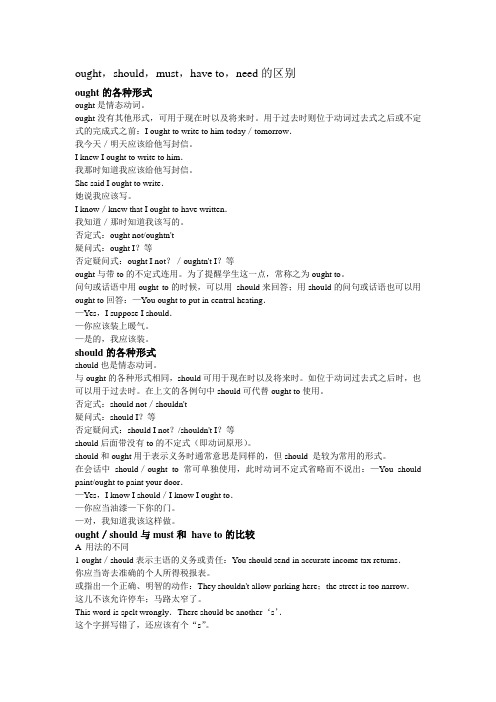
ought,should,must,have to,need的区别ought的各种形式ought是情态动词。
ought没有其他形式,可用于现在时以及将来时。
用于过去时则位于动词过去式之后或不定式的完成式之前:I ought to write to him today/tomorrow.我今天/明天应该给他写封信。
I knew I ought to write to him.我那时知道我应该给他写封信。
She said I ought to write.她说我应该写。
I know/knew that I ought to have written.我知道/那时知道我该写的。
否定式:ought not/oughtn't疑问式:ought I?等否定疑问式:ought I not?/oughtn't I?等ought与带to的不定式连用。
为了提醒学生这一点,常称之为ought to。
问句或话语中用ought to的时候,可以用should来回答;用should的问句或话语也可以用ought to回答:—You ought to put in central heating.—Yes,I suppose I should.—你应该装上暖气。
—是的,我应该装。
should的各种形式should也是情态动词。
与ought的各种形式相同,should可用于现在时以及将来时。
如位于动词过去式之后时,也可以用于过去时。
在上文的各例句中should可代替ought to使用。
否定式:should not/shouldn't疑问式:should I?等否定疑问式:should I not?/shouldn't I?等should后面带没有to的不定式(即动词原形)。
should和ought用于表示义务时通常意思是同样的,但should 是较为常用的形式。
在会话中should/ought to常可单独使用,此时动词不定式省略而不说出:—You should paint/ought to paint your door.—Yes,I know I should/I know I ought to.—你应当油漆—下你的门。

should和ought to的区别should和ought to是两个常见的词汇,经常在英语中被使用。
尽管它们有类似的意义,但在使用和语气上有一些微妙的区别。
should的使用::- should常用于表示建议、倡导或期望行为的情况。
- should通常用于一般情况下的建议,表示某种行为是明智、正确或有益的选择。
- should语气较轻松,有时有一点不确定或是可选的意味。
例如:- You should eat more fruits and vegetables.(你应该多吃水果和蔬菜。
)- You should watch this movie, it's really good.(你应该看这部电影,它非常好。
)- I should go to bed early tonight.(我今晚应该早点睡觉。
)ought to的使用::- ought to也表示建议或期望行为,但它通常带有更强烈的道德义务或责任感。
- ought to强调的是应该采取某种行动,因为这是一个责任、义务或是基于道德判断的选择。
- ought to语气更加坚定,表达的是强烈认为某种行为应该被执行。
例如:- You ought to apologize for what you said.(你应该为你所说的道歉。
)- We ought to help those in need.(我们应该帮助那些需要帮助的人。
)- She ought to study harder for the exam.(她应该更努力地研究考试。
)总结起来,should和ought to都表示建议和期望,但ought to 更加强调道义和责任感。
在实际使用中,根据语境和所表达的意义来选择合适的词汇会更加准确。
should和ought to在使用上有一些微妙的区别:- should常用于一般的建议,语气较轻松,有时不确定或可选。
- ought to强调的是应该采取某种行动,带有较强的道义义务感。
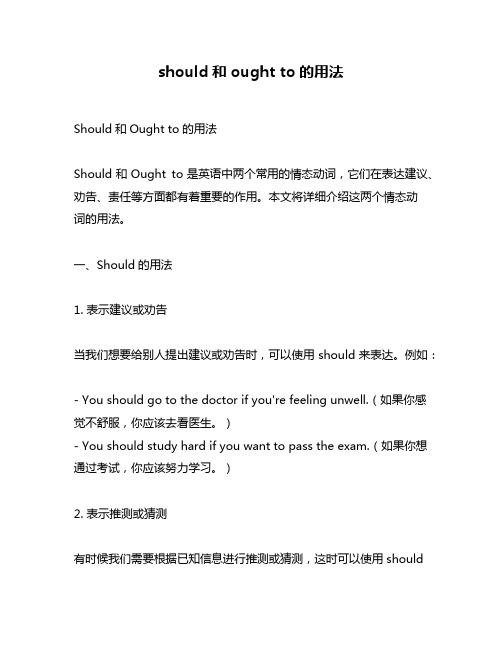
should和ought to的用法Should和Ought to的用法Should和Ought to是英语中两个常用的情态动词,它们在表达建议、劝告、责任等方面都有着重要的作用。
本文将详细介绍这两个情态动词的用法。
一、Should的用法1. 表示建议或劝告当我们想要给别人提出建议或劝告时,可以使用should来表达。
例如:- You should go to the doctor if you're feeling unwell.(如果你感觉不舒服,你应该去看医生。
)- You should study hard if you want to pass the exam.(如果你想通过考试,你应该努力学习。
)2. 表示推测或猜测有时候我们需要根据已知信息进行推测或猜测,这时可以使用should来表示。
例如:- It should be sunny tomorrow.(明天应该是晴天。
)- He should have arrived by now.(他现在应该已经到达了。
)3. 表示义务或责任当我们需要强调某人有义务或责任做某事时,可以使用should来表达。
例如:- You should apologize for what you did.(你应该为你所做的事情道歉。
)- The government should provide better healthcare for its citizens.(政府应该为其公民提供更好的医疗保健服务。
)4. 表示建议性的命令有时候我们需要给别人下达命令,但又不想显得太强硬,这时可以使用should来表示。
例如:- You should clean your room before your friends come over.(你朋友来之前你应该把房间打扫干净。
)- You should turn off the lights when you leave the room.(离开房间时你应该关掉灯。
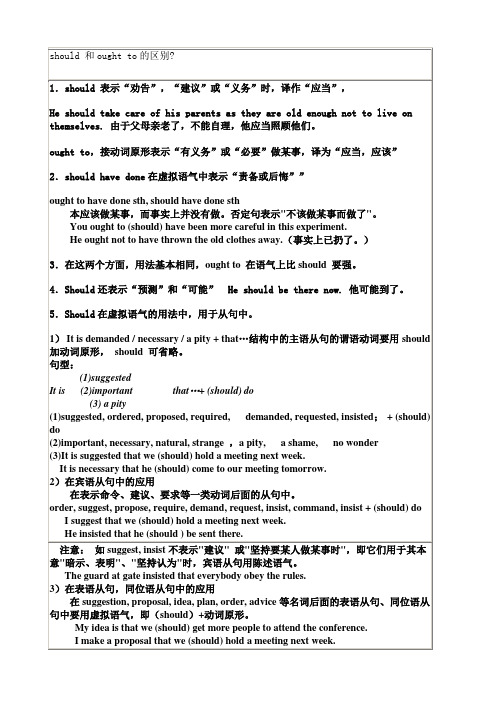

had better, should, ought to学习四要素had better, should, ought to 均为提建议型情态动词,常用来劝告别人去做某事,没有人称和数的变化,学习时应注意下列几点:一 . 掌握基本用法had better, should, ought to 含义及语气有所不同,请看下表:二 . 掌握创新用法should 可表竟然,强调惊讶的情绪。
I can't imagine this problem should be so easy.我想像不出这个问题竟然这么容易。
had better 也可改为 had best ,其意义和用法不变。
I'm busy now, so you had best go there alone.我现在很忙,所以你最好单独去那儿。
三 . 掌握句型变换方法had better, should, ought to 均属于助动词,其疑问句、否定句及反意疑问句的构成均在自身形式上做变化。
1. 变成否定句方法had better do 否定式为 had better not do, should do 否定式为 should not do 或shouldn't do, ought to do 否定式为 ought not to do 或 oughtn't to do 。
2. 变成一般疑问句方法had better, should, ought to 构成一般疑问句时应分别将 had, should, ought 提到句首,其肯定与否定回答为 had / hadn't, should / shouldn't, ought / oughtn't 。
3. 变成反意疑问句方法had better, should, ought to 构成反意疑问句时通常使用 had / hadn't, should / shouldn't, ought / oughtn't 形式。
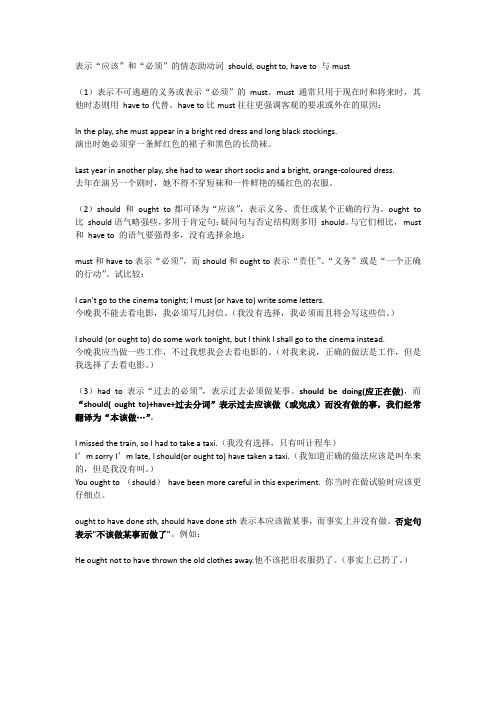
表示“应该”和“必须”的情态助动词should, ought to, have to 与must(1)表示不可逃避的义务或表示“必须”的must。
must通常只用于现在时和将来时,其他时态则用have to代替。
have to比must往往更强调客观的要求或外在的原因:In the play, she must appear in a bright red dress and long black stockings.演出时她必须穿一条鲜红色的裙子和黑色的长筒袜。
Last year in another play, she had to wear short socks and a bright, orange-coloured dress.去年在演另一个剧时,她不得不穿短袜和一件鲜艳的橘红色的衣服。
(2)should 和ought to都可译为“应该”,表示义务、责任或某个正确的行为。
ought to 比should语气略强些,多用于肯定句;疑问句与否定结构则多用should。
与它们相比,must 和have to 的语气要强得多,没有选择余地:must和have to表示“必须”,而should和ought to表示“责任”、“义务”或是“一个正确的行动”。
试比较:I can’t go to the cinema tonight; I must (or have to) write some letters.今晚我不能去看电影,我必须写几封信。
(我没有选择,我必须而且将会写这些信。
)I should (or ought to) do some work tonight, but I think I shall go to the cinema instead.今晚我应当做一些工作,不过我想我会去看电影的。
(对我来说,正确的做法是工作,但是我选择了去看电影。
)(3)had to表示“过去的必须”,表示过去必须做某事。

情态动词:Should和Ought toought to与should意思接近,大多数情况下二者可以互换,但是should谈的是自己的主观看法,ought to则更多反映客观情况,在谈到法律、义务和规定时使用。
如:I should go and see Mary tomorrow.我明天应该去看看Mary。
She is your mother, so you ought to support her.她是你妈妈,你应该赡养她。
We should/ought to help each other and learn from each other in our work.在工作中我们应该互相帮助互相学习。
ought to :它比must语气弱,但婉转。
They ought to be there by now. 他们现在一定到那了一般用于肯定和否定句ought 与不定式构成谓语动词。
主要用法如下:(1 )表示应该做某事。
例如:You ought to take his advice. 你应当接受他的劝告。
(2 )ought + 不定式的完成形式,表示本应该做某事。
例如:They ought to have handed in the paper yesterday. 他们本应当昨天交论文。
should :表示说话人的猜测,估计应该That should be Janet coming upstairs now. 正在上楼的准是珍妮特。
多用于第一人称。
should :(1) 表示劝告或建议。
例如:He should learn how to drive the car. 他应该学习怎样开车。
(2) 表示预测或可能。
例如:This kind of reference book should be in the reading-room. 像这样的参考书应该放在阅览室。
(3) 表示惊奇、愤怒、失望等感情。

had better, should, ought to用法had better, should, ought to是重要的情态动词,也是高考重要考点,学习时应注意下列几点:一、了解相互间关系had better(最好), should(应该)与ought to(应该)均为提建议、阐述观点的情态动词,其后接动词原形。
should 比had better语气强,ought to语气最强。
一般情况下should与ought to可通用。
例1:You had better go there at once.你最好立即去那里。
例2:You ought to / should work hard.你应该努力工作。
值得注意的是:should还有"竟然"之意,表出乎意料。
例:You can't imagine that a well-behaved gentleman should be so rude to a lady.你真是难以想象这么一个有风度的先生对一个女子是如此之粗鲁。
二、掌握句型变换方法had better, should, ought to作为情态动词,各种句型变换均在自身形式上作变化。
(一)否定句had better, should, ought to用于否定句时,否定词均位于其后,具体形式为:had better not do, shouldn't / should not do, oughtn't to do。
例1:You had better not start at this time.此时你最好别出发。
例2:He shouldn't be careless in class.他上课时不应粗心。
例3:She oughtn't to waste time.她不应该浪费时间。
(二)一般疑问句had better, should, ought to用于一般疑问句时,分别将had, should, ought提至句首。
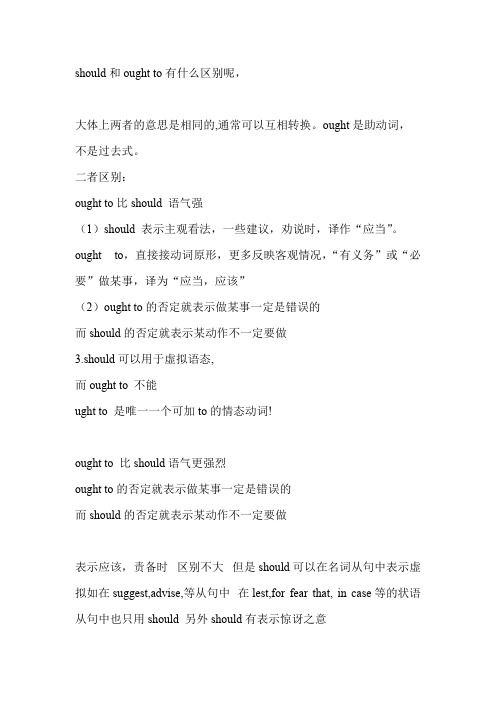
should和ought to有什么区别呢,大体上两者的意思是相同的,通常可以互相转换。
ought是助动词,不是过去式。
二者区别:ought to比should 语气强(1)should 表示主观看法,一些建议,劝说时,译作“应当”。
ought to,直接接动词原形,更多反映客观情况,“有义务”或“必要”做某事,译为“应当,应该”(2)ought to的否定就表示做某事一定是错误的而should的否定就表示某动作不一定要做3.should可以用于虚拟语态,而ought to 不能ught to 是唯一一个可加to的情态动词!ought to 比should语气更强烈ought to的否定就表示做某事一定是错误的而should的否定就表示某动作不一定要做表示应该,责备时区别不大但是should可以在名词从句中表示虚拟如在suggest,advise,等从句中在lest,for fear that, in case等的状语从句中也只用should 另外should有表示惊讶之意ought to与should意思接近,大多数情况下二者可以互换,但是should谈的是自己的主观看法,ought to则更多反映客观情况,在谈到法律、义务和规定时使用。
如:We should/ought to help each other and learn from each other in our work.She is your mother, so you ought to support her.We ought to go and see Mary tomorrow, but I don’t think we will.、ought to具体用法如下:1. (表示义务、责任等) 应当, 应该You ought to work harder than that.2. (表示劝告、建议等) 应该, 该You don't look well. You ought to go to see the doctor.3. (表示猜测、期望) 总应该,理应It ought to be a fine day tomorrow morning.4. “ought to + have + 过去分词”表示过去应做某事而实际未做You ought to have told me that (but you didn't).这时ought to和should可以互换使用。
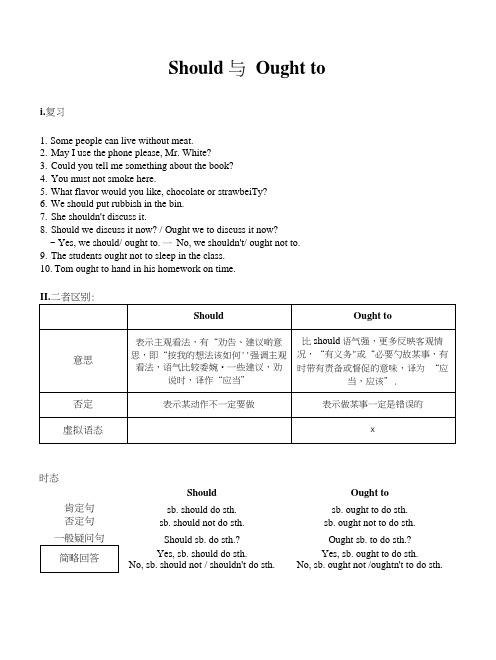
Should 与Ought toi.复习1.Some people can live without meat.2.May I use the phone please, Mr. White?3.Could you tell me something about the book?4.You must not smoke here.5.What flavor would you like, chocolate or strawbeiTy?6.We should put rubbish in the bin.7.She shouldn't discuss it.8.Should we discuss it now? / Ought we to discuss it now?~ Yes, we should/ ought to. 一No, we shouldn't/ ought not to.9.The students ought not to sleep in the class.10.Tom ought to hand in his homework on time.II.二者区别:Should Ought to意思表示主观看法,有“劝告、建议啲意思,即“按我的想法该如何''强调主观看法,语气比较委婉•一些建议,劝说时,译作“应当”比should语气强,更多反映客观情况,“有义务"或“必要勺故某事,有时带有责备或督促的意味,译为“应当,应该”.否定表示某动作不一定要做表示做某事一定是错误的虚拟语态X时态Should Ought to 肯定句sb. should do sth. sb. ought to do sth.否定句sb. should not do sth. sb. ought not to do sth.一般疑问句Should sb. do sth.? Ought sb. to do sth.?简略回答Yes, sb. should do sth. Yes, sb. ought to do sth.No, sb. should not / shouldn't do sth. No, sb. ought not /oughtn't to do sth.ought to具体用法:1・(表示义务、责任等)应当,应该You ought to work harder than that.2.(表示劝告、建议等)应该,You don't look well. You ought to go to see the doct 0匸3.(表示猜测、期望)总应该,理应It ought to be a fine day tomorrow morning.4.u ought to + have +过去分词”表示过去应做某事而实际未做You ought to have told me that (but you didn't). 这时ought to和should可以互换届用。
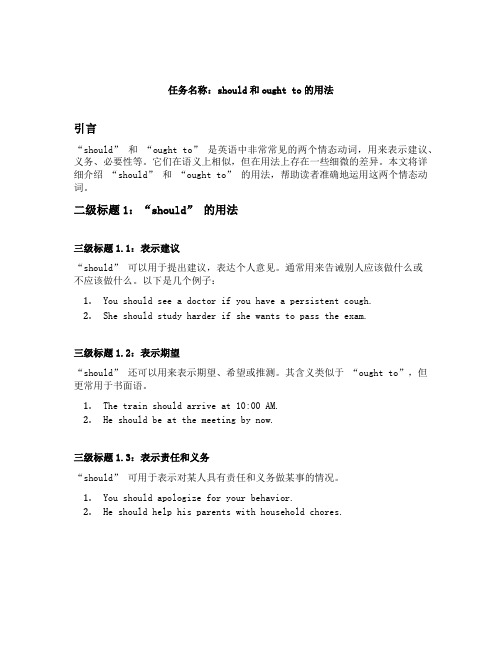
任务名称:should和ought to的用法引言“should” 和“ought to” 是英语中非常常见的两个情态动词,用来表示建议、义务、必要性等。
它们在语义上相似,但在用法上存在一些细微的差异。
本文将详细介绍“should” 和“ought to” 的用法,帮助读者准确地运用这两个情态动词。
二级标题1:“should” 的用法三级标题1.1:表示建议“should” 可以用于提出建议,表达个人意见。
通常用来告诫别人应该做什么或不应该做什么。
以下是几个例子:1.You should see a doctor if you have a persistent cough.2.She should study harder if she wants to pass the exam.三级标题1.2:表示期望“should” 还可以用来表示期望、希望或推测。
其含义类似于“ought to”,但更常用于书面语。
1.The train should arrive at 10:00 AM.2.He should be at the meeting by now.三级标题1.3:表示责任和义务“should” 可用于表示对某人具有责任和义务做某事的情况。
1.You should apologize for your behavior.2.He should help his parents with household chores.二级标题2:“ought to” 的用法三级标题2.1:表示道义上的期望“ought to” 用来表示道义上的期望,表示某事理应如此或某人应该做某事。
它比“should” 更加强调道德和义务。
1.You ought to respect your elders.2.We ought to protect the environment.三级标题2.2:表示推测“ought to” 还可以用来表示对未来情况的推测或猜测。

should和ought to的用法《英语中should和ought to的用法》引言:在英语中,should和ought to是常见的情态动词,用于表达建议、责任和义务等。
这两个词虽然有些相似,但它们在使用上有些微小的差别。
本文将深入探讨should和ought to的用法,帮助读者更好地理解如何在不同语境下正确运用这两个词。
一、should的用法:1. 表示建议:should常用于表示对某人提出的建议或忠告。
在面试前你应该准备一些常见的面试问题。
2. 表示期望:should还可以表示对某种情况或结果的期望。
他们应该在明天完成这个项目。
二、ought to的用法:1. 表示道义和义务:ought to常用于表示对某人道义上或法律上的义务或责任。
我们应该遵守交通规则。
2. 表示合理推断:ought to有时也可以用于表示合理的推断或假设。
根据他的经验,他应该能够解决这个问题。
三、should和ought to的区别:1. 语气:should通常用于表达建议和期望,语气较为委婉。
而ought to则更强调道义和义务,语气比should更为强烈。
2. 效果:由于强调道义义务,ought to在含义上往往比should更加严肃,对行为的要求也更高。
3. 用法:should更常用于口语和非正式场合,而ought to则更常用于书面语和正式场合。
总结回顾:通过对should和ought to的深入探讨,我们可以看出它们在用法上有些微小的差别。
should常用于表示建议和期望,语气较为委婉;而ought to则更强调道义和义务,语气更强,要求更高。
在实际运用中,我们需要根据语境和目的来选择使用哪个词。
个人观点:我认为,在日常生活中,我们应该灵活运用should和ought to,根据具体情况来选择使用。
当我们给予建议时,should的委婉语气可能更容易被接受;如果强调道德义务,ought to会更为恰当。
无论是should还是ought to,都是我们表达建议、责任和期望的有力工具,正确运用它们能够提升我们交流的准确性和效果。

高一英语情态动词should和oughtto辨析单选题40题1. You ______ study harder if you want to pass the exam.A. shouldB. ought toC. both A and BD. neither A nor B答案:C。
本题中should 和ought to 都可以表示“应该”,用于给出建议,语气上差别不大,在此语境中两者均可使用,所以选C 。
2. As a student, you ______ follow the school rules.A. shouldB. ought toC. both A and BD. neither A nor B答案:C。
在表示“义务”时,should 和ought to 意思相近,语气也较为接近,都适用于此句,所以选C 。
3. We ______ protect the environment.A. shouldB. ought toC. both A and BD. neither A nor B答案:C。
表达“责任”时,should 和ought to 均可,意思相同,语气无明显差别,因此选C 。
4. You ______ apologize for your mistake.A. shouldB. ought toC. both A and BD. neither A nor B答案:C。
此句中should 和ought to 都能用来表示“应该做某事”,语气和意思一致,所以选C 。
5. They ______ be on time for the meeting.A. shouldB. ought toC. both A and BD. neither A nor B答案:C。
在这种表示“应当”的情况下,should 和ought to 均可使用,两者在语气和语义上没有明显区别,故选C 。
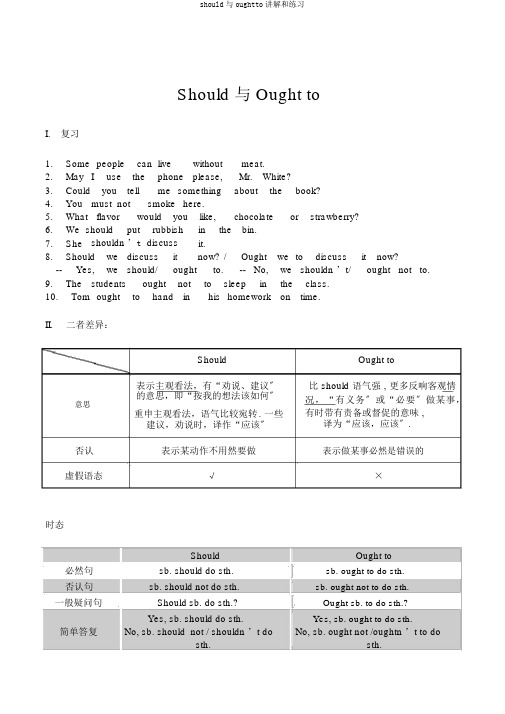
Should 与 Ought toI.复习1.Some people can live without meat.2.May I use the phone please,Mr.White?3.Could you tell me something about the book?4.You must not smoke here.5.What flavor would you like,chocolate or strawberry?6.We should put rubbish in the bin.7.She shouldn ’t discuss it.8.Should we discuss it now?/Ought we to discuss it now?--Yes,we should/ought to.-- No,we shouldn ’t/ought not to.9.The students ought not to sleep in the class.10.Tom ought to hand in his homework on time.II.二者差异:Should Ought to表示主观看法,有“劝说、建议〞的意思,即“按我的想法该如何〞意思重申主观看法,语气比较宛转. 一些建议,劝说时,译作“应该〞比 should 语气强 , 更多反响客观情况,“有义务〞或“必要〞做某事,有时带有责备或督促的意味 ,译为“应该,应该〞.否认表示某动作不用然要做表示做某事必然是错误的虚假语态√×时态Should Ought to 必然句sb. should do sth.sb. ought to do sth.否认句sb. should not do sth.sb. ought not to do sth.一般疑问句Should sb. do sth.?Ought sb. to do sth.?Yes, sb. should do sth.Yes, sb. ought to do sth.简单答复No, sb. should not / shouldn ’t do No, sb. ought not /oughtn ’t to dosth.sth.should 和 ought to在用法上要注意以下 3 点:1.没有人称和数的变化。
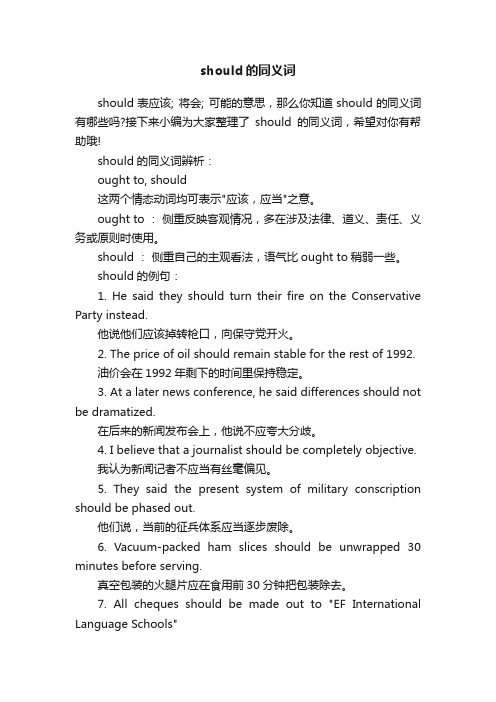
should的同义词should表应该; 将会; 可能的意思,那么你知道should的同义词有哪些吗?接下来小编为大家整理了should的同义词,希望对你有帮助哦!should的同义词辨析:ought to, should这两个情态动词均可表示"应该,应当"之意。
ought to :侧重反映客观情况,多在涉及法律、道义、责任、义务或原则时使用。
should :侧重自己的主观看法,语气比ought to稍弱一些。
should的例句:1. He said they should turn their fire on the Conservative Party instead.他说他们应该掉转枪口,向保守党开火。
2. The price of oil should remain stable for the rest of 1992.油价会在1992年剩下的时间里保持稳定。
3. At a later news conference, he said differences should not be dramatized.在后来的新闻发布会上,他说不应夸大分歧。
4. I believe that a journalist should be completely objective.我认为新闻记者不应当有丝毫偏见。
5. They said the present system of military conscription should be phased out.他们说,当前的征兵体系应当逐步废除。
6. Vacuum-packed ham slices should be unwrapped 30 minutes before serving.真空包装的火腿片应在食用前30分钟把包装除去。
7. All cheques should be made out to "EF International Language Schools"所有支票的收款人都应是“英孚国际语言学校”。
a lot of、lots of、a number of( /large numbers of)、a great deal of、plenty of的区别:五个“名词+介词”短语都表示“大量,许多”,a lot of(或lots of)既可以修饰不可数名词也可以修饰可数名词的复数形式,可以相应地换为much和many;plenty of“足够、大量”,既可以修饰不可数名词也可以修饰可数名词的复数形式。
a number of / large numbers of只可以修饰可数名词复数形式(它修饰的词作主语时谓语用复数形式)可以换为some、many、a lot of、plenty of。
a great deal of只可以修饰不可数名词(它修饰的词作主语时谓语用单数形式)可以换为much。
如:A lot of people think that time is money.(许多的人认为时间就是金钱。
)/ I don’t have to do it in a hurry because I have plenty of time.(我用不着赶忙,因为我有充足的时间。
) / I have a number of letters to write today.(今天我有好多信要写) / I spend a great deal of time/money on shopping.(在购物方面我花费了大量的时间/金钱。
)mount用作名词时,意为“数量”“金额”等,通常用于 a (great, large) amount of 这类结构,其后通常接不可数名词。
如:There was a fair amount of traffic on the roads. 路上的车辆颇多。
An increasing amount of organic produce is to be found on supermarket shelves. 越来越多的有机产品出现在超市货架上。
这类结构用作主语,其谓语的数取决于 amount 的数。
如:在这座桥上花了大量资金。
正:A large amount of money was spent on the bridge.正:Large amounts of money were spent on the bridge.注:偶尔也可见到其后接复数可数名词的用法,但不算普通。
如:The shopkeeper had a large amount of oranges in his storeroom. 店主在货仓里存有大量橙子。
——摘自《朗文当代高级英语词典》Even small amounts of these substances are known to cause skin problems. 我们知道这种物质即使是一丁点也会损害皮肤ought的各种形式ought是情态动词。
(参见第107节B。
)ought没有其他形式,可用于现在时以及将来时。
用于过去时则位于动词过去式之后或不定式的完成式之前:I ought to write to him today/tomorrow.否定式:ought not/oughtn´t疑问式:ought I?等否定疑问式:ought I not?/oughtn´t I?等ought与带to的不定式连用。
为了提醒学生这一点,常称之为ought to。
问句或话语中用ought to的时候,可以用should来回答;用should的问句或话语也可以用ought to回答:—You ought to put in central heating.—Yes,I suppose I should.140 should的各种形式should也是情态动词。
与ought的各种形式相同,should可用于现在时以及将来时。
如位于动词过去式之后时,也可以用于过去时。
在上文的各例句中should可代替ought to使用。
否定式:should not/shouldn´t疑问式:should I?等否定疑问式:should I not?/shouldn´t I?等should后面带没有to的不定式(即动词原形)。
should和ought用于表示义务时通常意思是同样的,但should 是较为常用的形式。
在会话中should/ought to常可单独使用,此时动词不定式省略而不说出:—You should paint/ought to paint your door.—Yes,I know I should/I know I ought to.141 ought/should与must和have to的比较A 用法的不同1 ought/should表示主语的义务或责任:You should send in accurate income tax returns.They shouldn´t allow parking here;the street is too narrow.This word is spelt wrongly.There should be another‘s´.这不像must那样牵涉到说话人的权威,也不像have to那样牵涉到外界权威(参见第145节),仅仅牵涉到良心或见识的问题:Pianist to pupil:You must practise at least an hour a day.Pupil to musical friend:I have to practise an hour a day!Musical friend:You ought to/should practise for more than an hour.2 ought/should与must和have to之间的又一区别在于,用must 和have to时通常给人的印象是一种义务正在被履行或将被履行。
主语为第一人称时尤其是这样,而其他人称为主语时也常是这样。
但ought/should则不使人特别感到义务正在或将要被履行。
它时常给人义务不在或不将得到履行的印象,在第一人称主语后更是如此。
如果一位驾驶员说I ought to/should go slowly here;it´s a built-up area(我是该在此慢行的,这是一个建筑物密集的地区),这通常这意味着他不想要放慢车速。
如果他真的要放慢车速,他会说I must go/have to go/I will have to go slowly here。
同样,如果某人说We must have a party to celebrate your engagement(我们必须举办一个聚会来庆祝你的订婚之喜),他的朋友们有相当理由相信会举行聚会的,但如果他说Weshould have a party…就不是非常确定无疑的事了,他说话的语气或表情可能表示不可能举行聚会。
B 用法中类似的地方1 should(但不是ought)可以用于正式通知或书面文告等:Candidates should be prepared to answer questions on…应试者应有准备回答……方面的问题。
Intending travellers should be in possession of the following documents…准备去旅行的人应备有以下的证明文件……On hearing the alarm bell,hotel guests should leave their rooms…听到警报铃声后,饭店的旅客必须离开各自的房间……在这里可以用must而不改变句子的意思,但在此should表示义务的口气更缓和些。
2 ought和should可表示忠告:You ought to/should read this.It´s very good.你应该读一下这个。
它写得很好。
但在语气较重的劝告中用must比较好:You must read this.It´s marvellous!你必须读这个。
写得精彩极了!142 ought/should与进行式连用ought/should与进行式连用时表示主语没有履行其义务,做了愚蠢、鲁莽的事等或做事不明智、不慎重等:He ought to be studying for his exam.He shouldn´t be spending all his time on the beach.他本该正在学习以备考试。
他不该把他的全部时间都在海滩上度过。
We should be wearing seat belts.我们应该系好安全带。
(但我们没有系安全带。
)I shouldn´t be telling you this.It´s supposed to be a secret.我不应该告诉你这件事。
这是个秘密。
143 ought/should与完成式连用这个结构用来表示没有覆行义务或不明智地忽略了该做的事。
在否定式中这一结构表示从前发生的、错误的或愚蠢的事。
You ought to have told him that the paint on that seat was wet.你本应该告诉他椅子上的油漆还没有干。
You should have turned his omelette;he likes it turned.你本应该给他摊的鸡蛋翻个身的;他喜欢吃两面都煎透的摊鸡蛋。
They ought to have stopped at the traffic lights.他们本应在红绿灯处停下。
She shouldn´t have opened the letter;it wasn´t addressed to her.她不应该拆开信,信封上写的不是她的名字。
The Emergency Exit doors shouldn´t have been blocked.紧急出口的门本来不应被堵死。